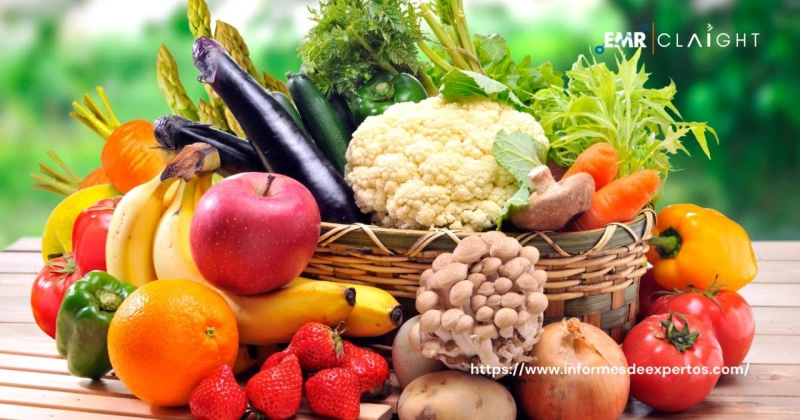The Chile fruit and vegetable market play a vital role in the country's agricultural landscape and global trade. In 2023, the market demonstrated its significance by reaching a commendable value of USD 1.75 billion. Projections indicate a promising growth trajectory, with an estimated compound annual growth rate (CAGR) of 4.07% between 2024 and 2032. By 2032, the market is anticipated to attain a worth of USD 2.45 billion. This growth reflects Chile's prowess in fruit and vegetable production and its strategic position in the global market.
Historical Context:
Chile's rich agricultural history has laid the foundation for its current status as a major player in the global fruit and vegetable market. The country's diverse climate, ranging from Mediterranean to subtropical, has allowed for year-round cultivation and export of a wide variety of fruits and vegetables. Over the years, Chile has gained a reputation as a reliable supplier of fresh produce to international markets.
Market Overview:
The Chilean fruit and vegetable market encompass a diverse array of products, including apples, grapes, avocados, berries, tomatoes, and more. Both domestic consumption and export activities contribute to the vibrancy of the market. The sector is characterized by innovation in cultivation practices, adherence to quality standards, and responsiveness to global market trends.
Key Products and Export Dynamics:
Chile is globally recognized for its production of high-quality fruits and vegetables. Grapes, particularly table grapes, stand out as a significant export product, along with cherries, blueberries, avocados, and apples. The country's ability to offer fresh produce during the Northern Hemisphere's off-season has positioned it as a key supplier to markets in North America, Europe, and Asia.
International Trade and Global Competitiveness:
Chile's fruit and vegetable market are deeply integrated into the global supply chain. The country's commitment to adhering to international quality and safety standards has enhanced its competitiveness. Free trade agreements with various countries and regions have facilitated market access and boosted Chile's standing as a reliable and competitive exporter of fresh produce.
Sustainable Practices and Organic Farming:
Sustainability and organic farming practices have gained prominence in Chile's fruit and vegetable industry. Producers are increasingly adopting environmentally friendly cultivation methods, emphasizing water conservation, integrated pest management, and organic certifications. This commitment aligns with global consumer preferences for sustainably sourced and organic produce.
Technological Advancements in Agriculture:
Technological advancements play a crucial role in optimizing fruit and vegetable production in Chile. Precision agriculture, greenhouse technologies, and advanced irrigation systems contribute to increased yields, improved quality, and resource efficiency. These innovations empower farmers to navigate challenges such as water scarcity and climate variability.
Government Initiatives and Regulatory Framework:
Government initiatives and regulatory frameworks support the growth and sustainability of the fruit and vegetable market in Chile. Policies addressing food safety, export regulations, and research and development contribute to the sector's resilience. Collaborations between the government and industry stakeholders foster an environment conducive to innovation and competitiveness.
Challenges and Opportunities:
Challenges such as climate variability, access to water resources, and fluctuations in global demand pose considerations for the Chilean fruit and vegetable market. However, these challenges also present opportunities for diversification, the introduction of value-added products, and strategic partnerships to address evolving market dynamics.
Cultural and Culinary Significance:
Fruits and vegetables hold cultural and culinary significance in Chilean cuisine. From traditional dishes to modern gastronomy, fresh produce is integral to the nation's culinary identity. The export success of Chilean fruits has not only contributed to the country's economic growth but has also elevated its reputation as a purveyor of premium agricultural products.
Future Outlook and Innovation:
The future outlook for the fruit and vegetable market in Chile is optimistic, with a continued focus on sustainability, innovation, and market diversification. Ongoing research in crop improvement, resilience to climate change, and exploration of emerging markets are expected to shape the sector's trajectory in the coming years.
Read More Reports:
https://www.informesdeexpertos.com/informes/mercado-de-alimentos-para-perros-en-mexico
https://www.informesdeexpertos.com/informes/mercado-de-alimentos-funcionales-en-argentina
https://www.informesdeexpertos.com/informes/mercado-de-autobuses-electricos-en-america-latina
https://www.informesdeexpertos.com/informes/mercado-de-bebidas-energizantes-en-peru
https://www.informesdeexpertos.com/informes/mercado-de-gestion-integrada-de-instalaciones
https://www.informesdeexpertos.com/informes/mercado-de-protesis-dentales



